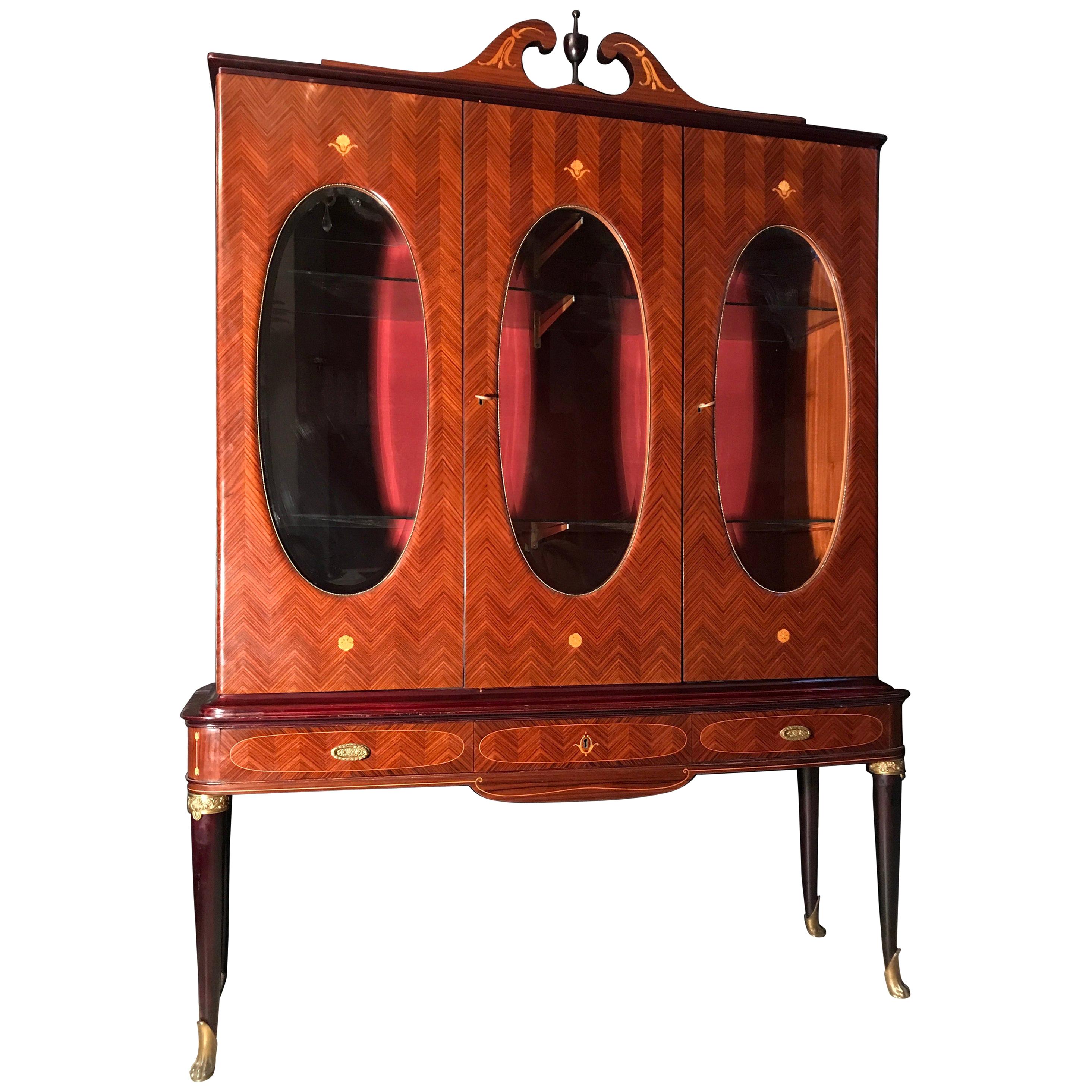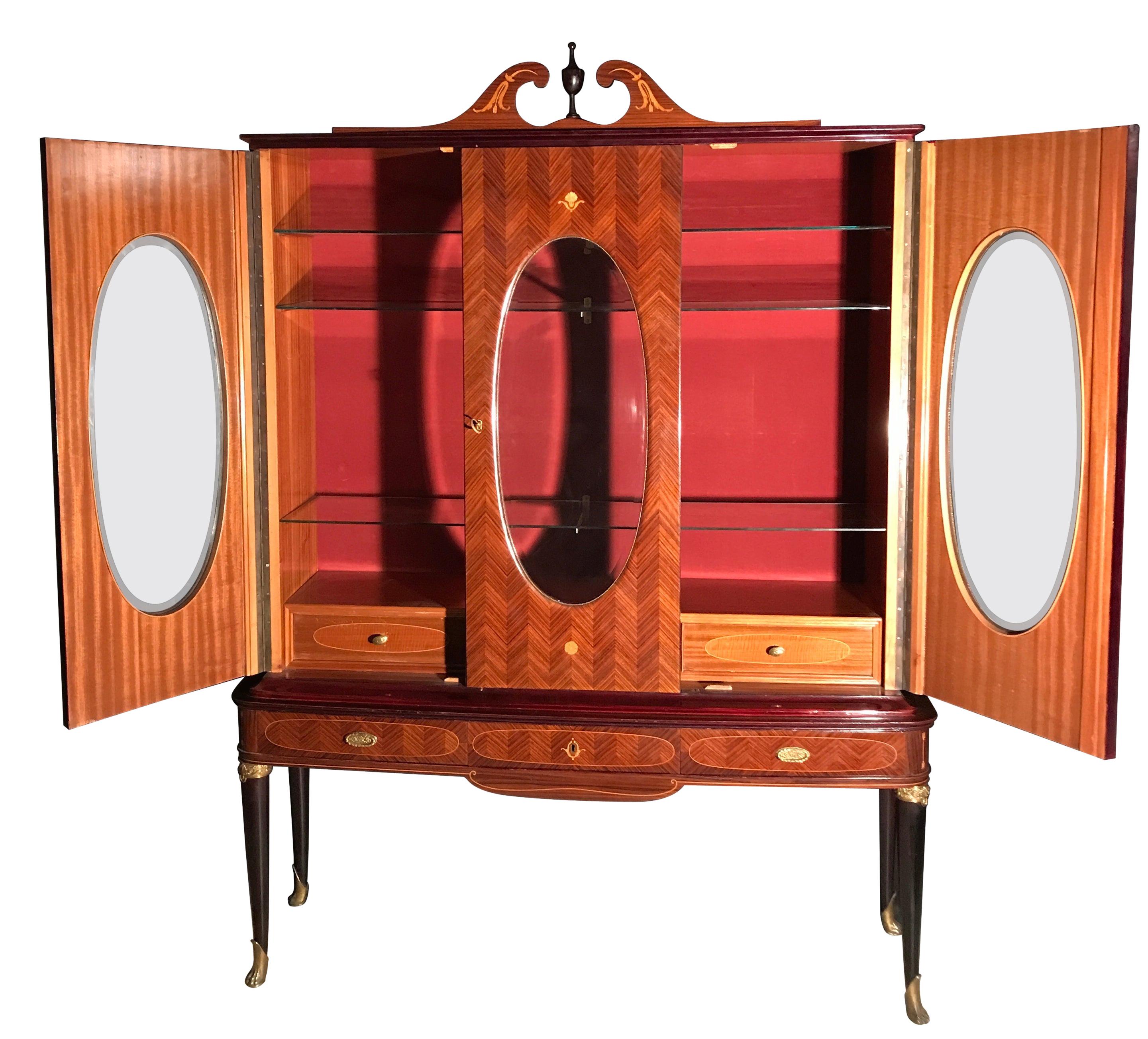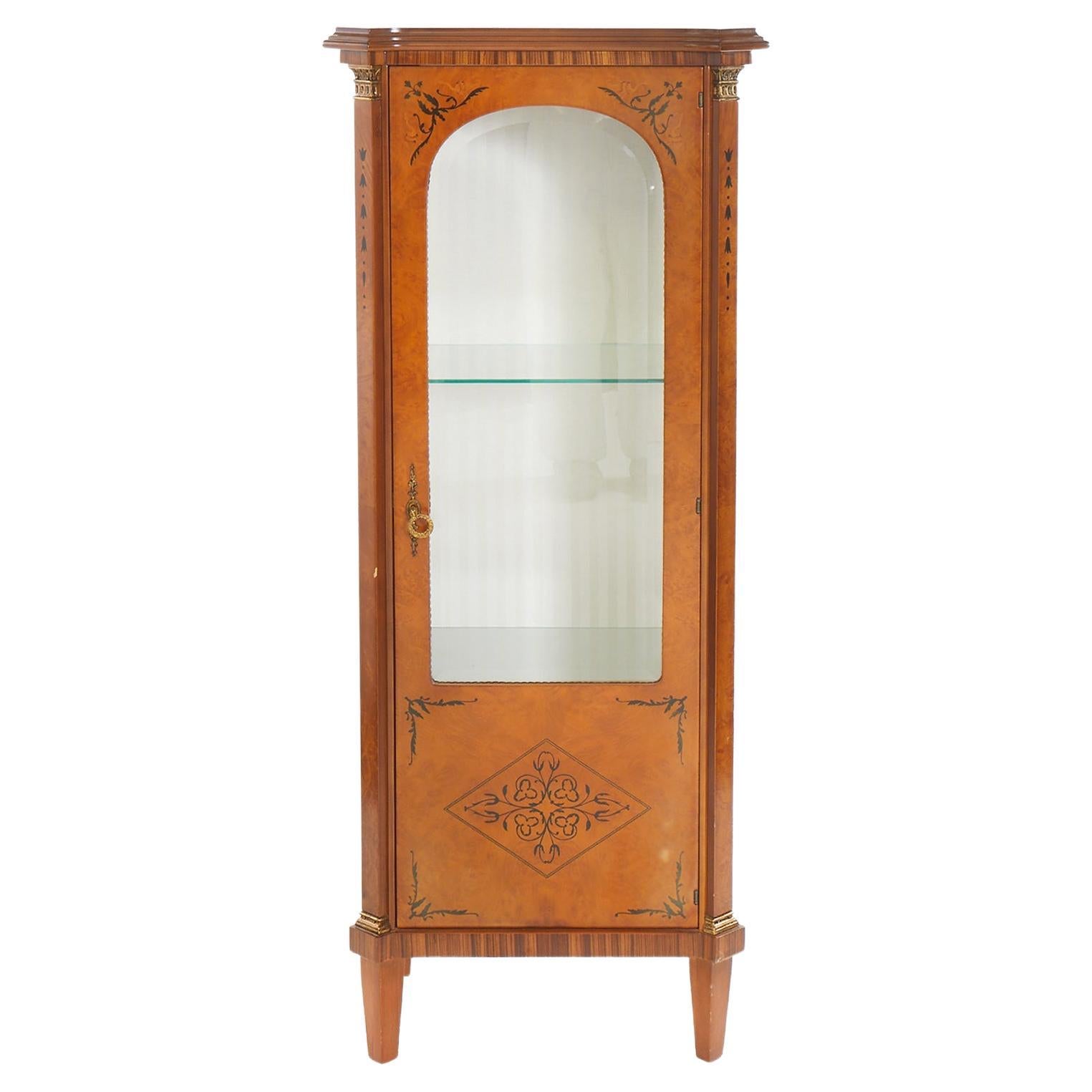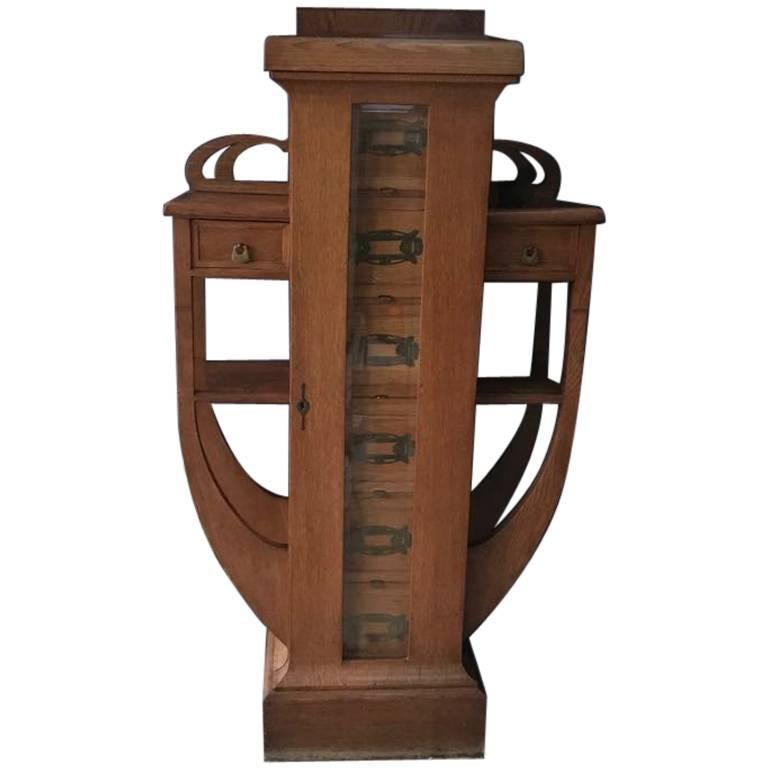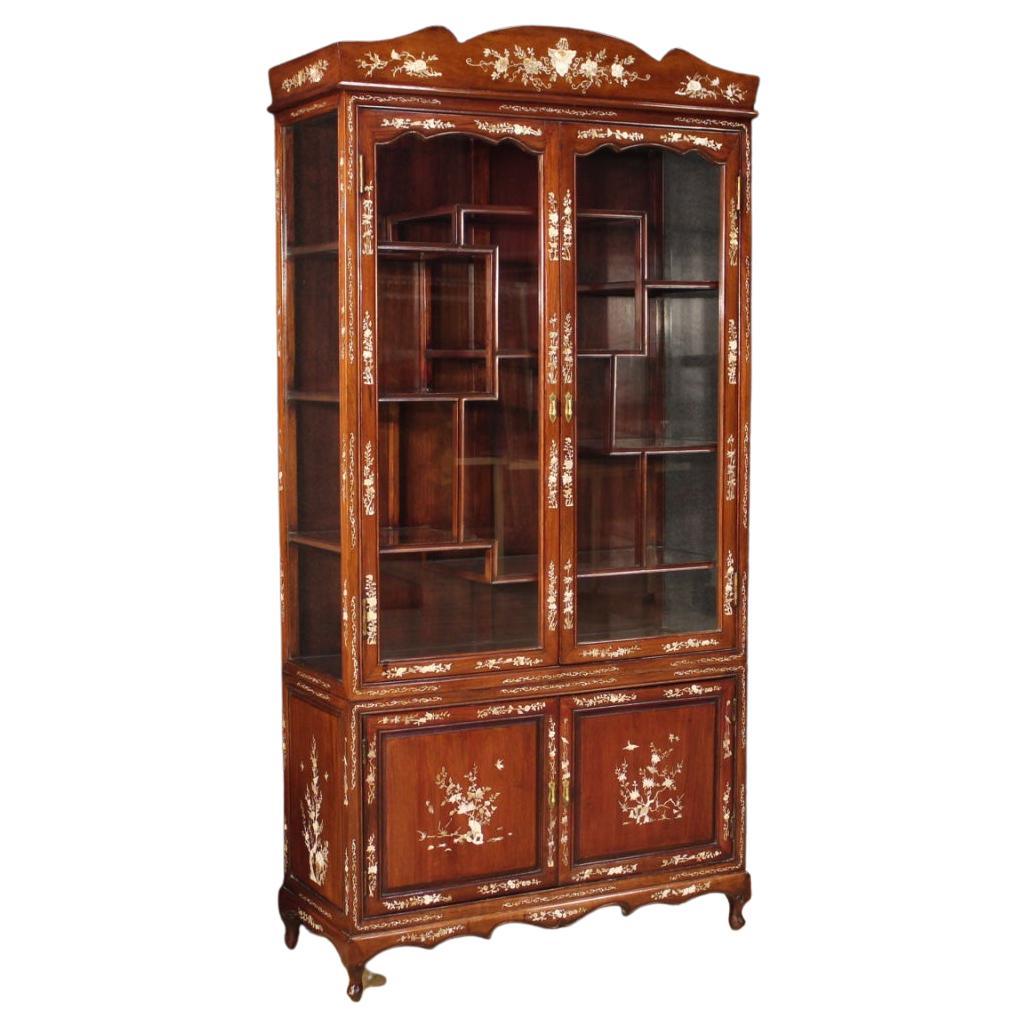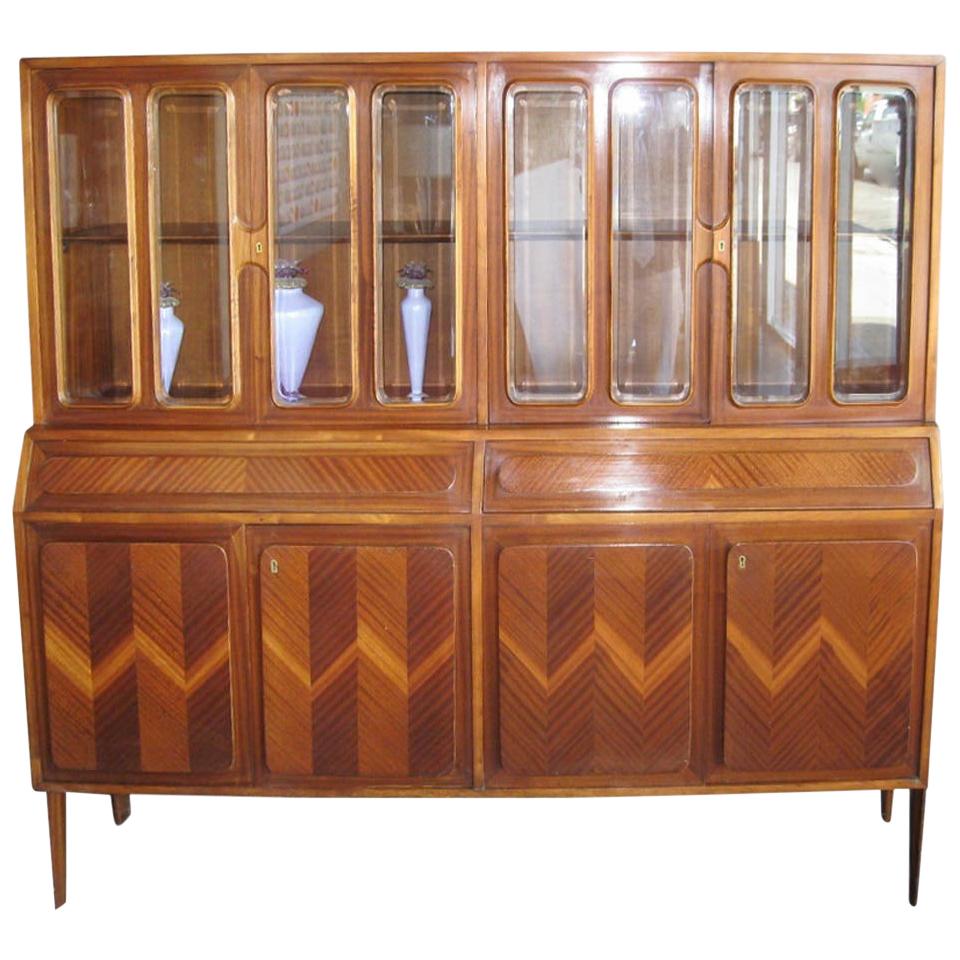Items Similar to Vitrine Attributed to Carlo Zen, Italian Design Liberty, Wood , Mother of Pearl
Video Loading
Want more images or videos?
Request additional images or videos from the seller
Vitrine Attributed to Carlo Zen, Italian Design Liberty, Wood , Mother of Pearl
About the Item
Vitrine Attributed to Carlo Zen, Italian Design
Style:Liberty,
Country: Italy
Materials: wood , inlaid metal threads, mother of pearl, brass, and gold leaf
We have specialized in the sale of Art Deco and Art Nouveau styles since 1982.If you have any questions we are at your disposal.
Pushing the button that reads 'View All From Seller'. And you can see more objects to the style for sale.
Attributed to Carlo Zen
At the turn of the 20th century, Carlo Zen was the owner of the largest furniture workshop in Milan. Under his direction the firm created ornate pieces in the Stile Floreale, the Italian version of Art Nouveau. Like Art Nouveau in France, Zen’s Italian style showcased luxurious handcraft and materials like inlaid metal threads, mother of pearl, brass, and gold leaf. A typical piece from Zen’s workshop would feature sensually curving wooden lines decorated with Asian-inspired flowers or exotic motifs like inlaid palm trees and a gold leaf sun. His son, Piero Zen, was also a furniture designer.
Why are there so many antiques in Argentina?
In the 1880 – 1940 there was a grate wave of immigration encouraged by the periods of war that were taking place.
1st World War took place between 1914 and 1918
2nd World War took place between 1939 and 1945
The immigrants options were New York or Buenos Aires. Tickets were cheap and in Buenos Aires they were welcomed with open arms, as it was a country where everything was still to be done.
Argentina was the country of new opportunities, labour was needed and religious freedom was assured, in many cases the of the family travel first until they were settled and then the rest of the family members join them.
In the immigrant museum “Ellis Island Immigrant Building” in New York you can se the promotional posters of the boats that would take them to a new life.
Between the years 1895 and 1896, Argentina had the highest DGP (gross domestic product) per capita in the world according to the Maddison Historical Statistics index, this situation arose due to the large amount of food being exported to European countries, which were at war.
The Argentinean ships left the port of Buenos Aires with food, but they returned with furniture, clothes and construction elements, (it´s common to see this the old buildings of the historic neighbourhood of San Telmo, the beams with the inscription “Made in England)”, as well as many markets that were built in Buenos Aires, such us the San Telmo Market, whose structure was brought by ship and afterwards assembled in 900 Defensa Street.
With the great influence of European immigrants living in the country, the children of the upper classes travelled to study in France, resulting in the inauguration of “La Maison Argentinienne”, on 27th of June 1928, in the international city of Paris, which hosted many Argentinians that were studying in Frace.
It´s the fourth house to be built after France, Canada and Belgium, being the first Spanish-speaking one. Still in place today (17 Bd Jourdan, 75014, Paris, France). Many of the children of these wealthy families who attended international art exhibitions, museums and art courses abroad, took a keen interest in the European style. This is why Buenos Aires was at the time referred as “The Paris of South America”.
Between the years 1890 and 1920 more than a hundred Palaces were built on Alvear Avenue the most exclusive avenue in Buenos Aires. Today some of these palaces have been transformed into museums, hotels and embassies.
In the year 1936, the Kavanagh building was inaugurated, it was the tallest reinforced concrete building in South America.
During 1994 the American Society of Civil Engineers distinguished it as an “international engineering milestone”, and it´s now considered a World Heritage of Modern Architecture.
At the time was common to hire foreign architects such as Le Corbusier, who visited Buenos Aires/Argentina in 1929 and in 1948 he drew up the blueprints for a house built in La Plata City (which was declared a World Heritage Site).
In 1947, the Hungarian architect Marcelo Breuer designed “Parador Ariston” in the seaside city of Mar del Plata. After an Argentinean student at Harvard University convinced him to come to Argentina. He worked on an urban development project in the Casa Amarilla, area of La Boca.
The Ukrainian architect, Vladimiro Acosta, arrives in Argentina in 1928 and worked as an architect until que moved to Brazil.
Antonio Bonet, a Spanish architect who worked with Le Corbusier in Paris, arrives in Argentina in 1937, where he carried out several architectural works and in 1938 designs the well-known BFK chair.
Andres Kálnay, of Hungarian origin, made around 120 architectural masterpieces, among which the former Munich brewery stands out, he even made the furniture’s design.
The German architect, Walter Gropius, director of the Bauhaus, lived in Argentina, where he wrote articles for “Sur” magazine and founded in Buenos Aires, an architectural firm with Franz Möller, who was also an architect, where he built two houses.
At the same time several famous designers decided to immigrate to Argentina, among them we can find the well-known French designer, Jean-Michel Frank, who arrived in the country in 1940 and also worked for the Rockefeller family.
Special pieces were made, which were sold exclusively in the country, such as the well-known German company “WMF”, who sold their products by catalogue, which were chosen by the ladies of high society in the list of wedding gifts, as well as the pieces designed by Christofle.
The Swiss sculptor Alberto Giacometti, made special pieces for Argentinean mansions.
In 1904 the first Jansen branch outside Paris was established in Buenos Aires, as the Argentinean clientele demanded a large amount of furniture, from the end of the 19th century to the mid-20th century.
In 1970, the brand Rigolleau Argentina made pieces authorised by Lalique.
The brands Maple and Thompson also set up shop in the country.
The French plastic artist, Marcel Duchamp moved to Argentina in 1918-1919.
Glass signed Gallé, Charder, Leverre, Schneider, Muller and other French firms. They were bought in flower shops and were given to ladies with beautiful floral arrangements.
Some furniture manufacturers travelled to international fairs and bough the patterns to produce the furniture in Argentina, such as the furniture firm Englander and Bonta, who bought the patterns ins Italy.
It is worth mentioning that in Argentina we have the largest community of Italians outside of Italy, as it is estimated that 70 percent of the inhabitants have at least one Italian descendant, followed by Spanish immigrants.
The most Important furniture stores in Argentina:
Comte is founded in 1934 (under the direct management of Jean Michel Frank in 1940).
Nordiska (Swedish company established in 1934).
Churba in 1960, a company that brought foreign designers to present their furniture in the country:
Denmark: (Arne Jacobsen, Finn Juhl, Bender Madsen, Ejner Larsen, Poul Kjaerholm, Hans Wegner)
Sweden: (Hans Agne Jakobsson, Gustavsberg)
United States: (Herman Miller)
Finland: (Lisa Johansson, Folke Arstrom, Tapio Wirkkala, Alvar Aalto, Timo Sarpaneva)
Swedish Factory: (Orrefors)
Italy: (Littala, Vico Magistretti, Emma Gismondi, Gae Aulenti, Angelo Mangiarotti, Elio Martinelli, Gianna Celada, Angelo Mangiarotti, Mario Bellini, Carlo Scarpa)
Finland: (Olivia Toikka)
Plata Lappas (Lappas Silver): a goldsmith shop founded in 1887 in Argentina by Alcibiades Lappas of Greek origin.
In 2019, in Argentina took place “the Art Deco world congress”, in which we participated as hosts invited by Geo Darder, founder of the Copperbridge – Foundation, in which prominent people from all over the world attended to learn about Art Deco in Argentina.
Argentina currently has more than 100 Art Deco buildings and another 90 Art Nouveau buildings throughout the city of Buenos Aires.
Argentina is a country that has not been involved in many wars, which is why it has been a refuge for works of art and antiques from different periods of time, unlike European countries. That is way many collectors, museums and antique dealers from all over the world visit it, you should not miss the opportunity to visit this great country.
Laura Guevara Kjuder, architect.
- Attributed to:Carlo Zen (Designer)
- Dimensions:Height: 86.62 in (220 cm)Width: 13.78 in (35 cm)Depth: 35.44 in (90 cm)
- Style:Art Nouveau (Of the Period)
- Materials and Techniques:
- Place of Origin:
- Period:1900-1909
- Date of Manufacture:1905
- Condition:Refinished. Wear consistent with age and use.
- Seller Location:Ciudad Autónoma Buenos Aires, AR
- Reference Number:
About the Seller
5.0
Vetted Seller
These experienced sellers undergo a comprehensive evaluation by our team of in-house experts.
Established in 1982
1stDibs seller since 2022
23 sales on 1stDibs
Typical response time: <1 hour
- ShippingRetrieving quote...Ships From: Ciudad Autónoma Buenos Aires, Argentina
- Return PolicyThis item cannot be returned.
More From This SellerView All
- Vitrine Attributed to Maison Jansen in LeatherBy Maison JansenLocated in Ciudad Autónoma Buenos Aires, CYear 1930 Country: French Materials : wood, mirror and glass We have specialized in the sale of Art Deco and Art Nouveau styles since 1982. If you have any questions we are at your ...Category
Vintage 1920s French Art Deco Vitrines
MaterialsWood, Glass, Mirror
- Furniture in Wood, Art Deco, "Attributed to Louis Süe and André Mare", 1930By Andre MareLocated in Ciudad Autónoma Buenos Aires, CAmazing bookcase Art Deco Style: French We have specialized in the sale of Art Deco and Art Nouveau and Vintage styles since 1982.If you have any questions we are at your disposal. Pushing the button that reads 'View All From Seller'. And you can see more objects to the style for sale. Attributed to Louis Süe and André Mare Louis Süe (14 July 1875 – 7 August 1968) was a French painter, architect, designer and decorator. He and André Mare co-founded the Compagnie des arts français, which produced Art Deco furniture and interior decorations for wealthy customers. He also designed buildings and interiors, including the interiors of two passenger liners. Marie-Louis Süe was born on 14 July 1875 in Bordeaux. He was the grand nephew of the writer Eugène Sue.His father was a wine merchant. After graduating from secondary school he entered the Collège Sainte-Barbe in Paris to prepare for the École Polytechnique. However, in 1893 he left Sainte-Barbe and entered the École des Beaux-Arts where he studied painting in the studio of Victor Laloux (1850–1937). During this period he also explored architectural design, and was awarded medals for his work. He gained his diploma in 1901. Süe made friends at the Beaux-Arts with the painters Pierre Bonnard, Roger de La Fresnaye, André Derain and André Dunoyer de Segonzac. In 1902 the Salon des Indépendants and the Salon d'Automne showed his work. Süe's work always combined an understanding and respect for traditional forms with a willingness to explore the new. n 1919 Süe and André Mare founded the Compagnie des arts français (French Arts Company) and in 1921 published their first designs of furniture, wallpaper, tapestries, silverware and ceramics. The company employed many artists and craftsmen to meet the needs of their sophisticated and wealthy clientele for interior decoration. The Metropolitan Museum acquired examples of their furniture as early as 1923. Their Art Deco works, typically with flower designs, were both elegant and practical. Süe and Mare decorated interiors such as the Polish Embassy in Paris and the home of Jean Patou.[2] In their joint work Architectures (1921) Sue and Mare asserted that Art Nouveau was based on a synthesis of fine and decorative arts. Their commercial designs often had simplified forms with rich materials. In 1922 Süe designed the industrial town of Lens-Méricourt for the French Northern Railway company.[1] In 1922 the Compagnie des arts français obtained financial support from Gaston Monteux, owner of the Raoul shoe firm.Süe and Mare worked together again for the 1925 International Exposition of Modern Industrial and Decorative Arts in Paris, where they built a contemporary art museum and the Fountain pavilion on the Esplanade des Invalides. They showed a luxurious room in the grand salon with furniture, carpet, wallpaper and decorations in new forms linked to traditional designs.They also collaborated that year on the interior decoration of the SS Île de France...Category
Vintage 1930s French Art Deco Bookcases
MaterialsGlass, Wood
- Pair of Art Deco French Vitrines, 1930, Materials: Wood and GlassLocated in Ciudad Autónoma Buenos Aires, CYear: 1930 Country: French We have specialized in the sale of Art Deco and Art Nouveau and Vintage styles since 1982. If you have any questions we are at your disposal. Pushing the b...Category
Vintage 1930s French Art Deco Vitrines
MaterialsGlass, Wood
- Pair of Art Deco Vitrines, 1930, French, Materials: Wood, Mirror and GlassLocated in Ciudad Autónoma Buenos Aires, CYear: 1930 Country: French We have specialized in the sale of Art Deco and Art Nouveau and Vintage styles since 1982. If you have any questions we are at your disposal. Pushing the b...Category
Vintage 1930s French Art Deco Vitrines
MaterialsMirror, Glass, Wood
- Art Deco Vitrine, 1930, French, Materials: Wood, Bronze and GlassLocated in Ciudad Autónoma Buenos Aires, CYear: 1930 Country: French We have specialized in the sale of Art Deco and Art Nouveau and Vintage styles since 1982. If you have any questions we are at your disposal. Pushing the b...Category
Vintage 1930s French Art Deco Vitrines
MaterialsBronze
- Umbrella stand Jugendstil, Art Nouveau, Liberty - Frances, 1900Located in Ciudad Autónoma Buenos Aires, CIncredible Jugendstil, Art Nouveau, Liberty Vitrine Country: France We have specialized in the sale of Art Deco and Art Nouveau styles since 1982.If you have...Category
Antique Early 1900s French Art Nouveau Vitrines
MaterialsIron
You May Also Like
- Italian Design Midcentury Cabinet Vitrine Attributed to Paolo BuffaBy Paolo BuffaLocated in Rome, ITWell designed and finished with valuable materials. Ormolu-mounted, carved and inlaid with rare woods. Paolo Buffa was named one of the most important designers in Italy. Archit...Category
Mid-20th Century Italian Mid-Century Modern Cabinets
MaterialsWood
- Italian Design Midcentury Cabinet Vitrine Attributed to Paolo BuffaBy Paolo BuffaLocated in Rome, ITWell designed and finished with valuable materials. Ormolu-mounted, carved and inlaid with rare woods. Paolo Buffa was named one of the most important designers in Italy. Architec...Category
Mid-20th Century Italian Mid-Century Modern Cabinets
MaterialsWood
- Italian Marquetry Wood Vitrine / CabinetLocated in Tarry Town, NYMid 20th century Italian kingwood vitrine / china cabinet. The china cabinet features exterior front inlay marquetry design with two interior glass shelves and upholstered backslash....Category
Vintage 1950s Italian Cabinets
MaterialsBrass
- Chest of Drawers by Carlo Zen MilanoBy Carlo ZenLocated in Mexico City, MXCarlo Zen was the owner of the largest furniture workshop in Milan. Under his direction the firm created ornate pieces in the Stile Floreale, the Italian version of Art Nouveau.Category
Early 20th Century Italian Art Nouveau Cabinets
MaterialsWood
- 20th Century Wood and Faux Mother of Pearl Oriental Display Cabinet, 1960Located in Vicoforte, PiedmontOriental showcase from the mid-20th century. Furniture of exceptional quality carved in mahogany and exotic woods adorned with rich inlay in faux mother of pearl with floral decorati...Category
Mid-20th Century Chinese Vitrines
MaterialsWood
- Wonderful Italian Vitrine CabinetBy Osvaldo BorsaniLocated in Los Angeles, CAWonderful Italian vitrine cabinet.Category
Vintage 1940s Italian Other Vitrines
MaterialsWood
Recently Viewed
View AllMore Ways To Browse
Antique Wood Designs
Antique Wood Design
Antique To Modern Furniture
Ship To Italy
Wood Design Company
Antique Sign Designs
Antique Shop Design
Antique Wood Products
Antique Wood Product
Bauhaus Design Wood
Antique Wood Shop
Italian Heritage Pieces
Zen Modern
Wood Hotel Italy
Antique Woods Of La
Mother Of Pearl Cabinet
Se Design
Cabinet With Mother Of Pearl
